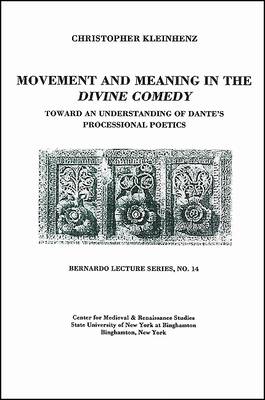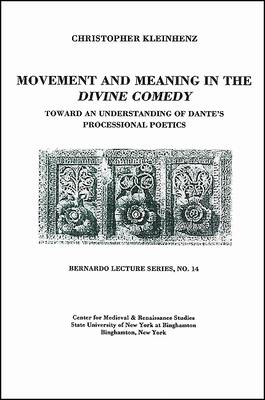
- Afhalen na 1 uur in een winkel met voorraad
- Gratis thuislevering in België vanaf € 30
- Ruim aanbod met 7 miljoen producten
- Afhalen na 1 uur in een winkel met voorraad
- Gratis thuislevering in België vanaf € 30
- Ruim aanbod met 7 miljoen producten
Zoeken
Movement and Meaning in the Divine Comedy: Toward an Understanding of Dante's Processional Poetics
Bernardo Lecture Series, No. 14
Christopher Kleinhenz
€ 30,45
+ 60 punten
Omschrijving
Christopher Kleinhenz's Movement and Meaning in the Divine Comedy: Toward an Understanding of Dante's Processional Poetics is the fourteenth in a series of publications occasioned by the annual Bernardo Lecture at the Center for Medieval and Early Renaissance Studies (CEMERS) at Binghamton University. This series offers public lectures which have been given by distinguished medieval and Renaissance scholars on topics and figures representative of these two important historical, religious, and intellectual periods. In Movement and Meaning in the Divine Comedy, Kleinhenz argues that the analysis of movement and its correlative procession in the Divine Comedy is fundamental to an understanding of how Dante generates meaning in his poetic text. References to movement--both linear and circular--in the poem are generally filled with significance. As the mimetic representation of the Pilgrim's journey from Hell to Paradise, the entire Comedy may be seen as a procession, during which Dante also observes an assortment of processions, which because of their more formalized nature, have specific meaning for his journey. As Dante progresses toward his goal, he acquires knowledge, gains experience, and receives moral and spiritual enlightenment. His journey is at once linear and circular, linear in its progression toward the Beatific Vision and circular in that at the end of the poem he is once more returned to earth. The way in which Dante incorporates movement to generate meaning in the text might be termed his "processional poetics." In addition to considering both the idea of a "procession" as a special kind of ritualized motion and some of the sources of processions (biblical, historical, literary, artistic) that may have influenced Dante, the essay examines several specific examples with regard to their incorporation of movement and/or procession- the episodes in Inferno 5 (the lustful), 6 (the gluttons), 7 (the avaricious and the prodigal) and 34 (Lucifer), the mystical procession in Purgatory 29, the series of allegorical tableaux in Purgatory 32, and various moments in Paradise (Cantos 10, 12, 20, 23, 30). Finally, the seeming conflict between linear and circular movement in the Comedy is resolved when Dante recognizes the linear process of transformation as the necessary preparatory stage for putting the soul in circular harmony with the celestial spheres. Thus, Dante is able to manifest in himself the ultimate triumph of circularity over linearity, of the spirit over matter, and of eternity over time.
Specificaties
Betrokkenen
- Auteur(s):
- Uitgeverij:
Inhoud
- Aantal bladzijden:
- 58
- Taal:
- Engels
- Reeks:
Eigenschappen
- Productcode (EAN):
- 9781586842598
- Verschijningsdatum:
- 1/01/2005
- Uitvoering:
- Paperback
- Formaat:
- Trade paperback (VS)
- Afmetingen:
- 132 mm x 211 mm
- Gewicht:
- 90 g

Alleen bij Standaard Boekhandel
+ 60 punten op je klantenkaart van Standaard Boekhandel
Beoordelingen
We publiceren alleen reviews die voldoen aan de voorwaarden voor reviews. Bekijk onze voorwaarden voor reviews.








